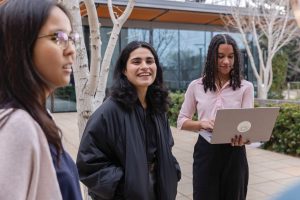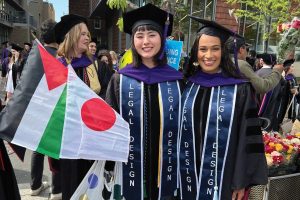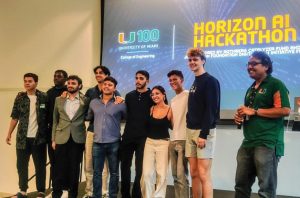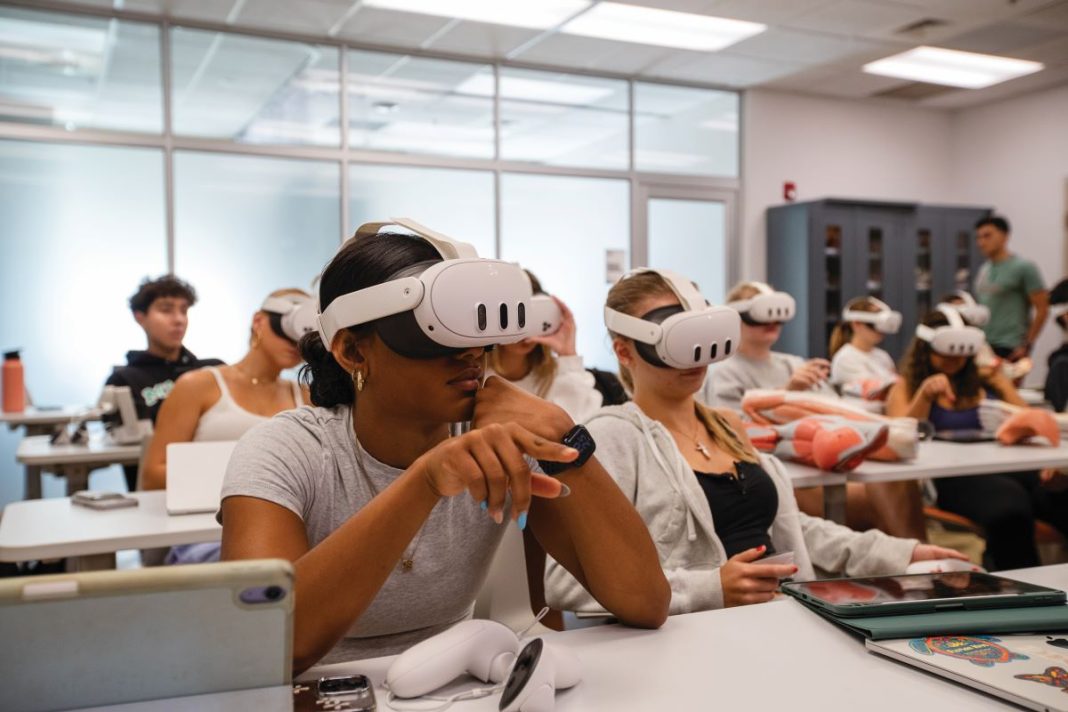AI may dominate the conversation, but innovation in law schools now reaches far beyond technology, transforming how students learn and how future lawyers serve clients.
“Innovation is so much different than it was five years ago,” said Jon Garon, professor and director of the Goodwin Program for Society, Technology and the Law at Nova Southeastern University Shepard Broad College of Law. “Five years ago, if you launched a new center or a new course, that was pushing the envelope. With AI now, it’s about translating skills across the student body and not about a single course. It’s about making those skills really relevant to the rapidly changing legal practice.”
For Garon, who helped evaluate this year’s nominations for preLaw’s Most Innovative Law Schools, the highest measure of innovation is scale and impact.
“The highest level is the extent at which the programs can take these skills and build them into service leaders,” he said.
That means weaving technology and problem-solving into classrooms, clinics and client service.
“This year is 100% AI,” Garon said. “Next year is going to be about law firm efficiency. Then the next issue is going to be education personalization; we’re on the cusp of tools that can actually be better than the classroom.”
Students, he noted, must be central to the process.
“The students have to be partners in all of this,” he said. “Some of our students are our leaders and we have opportunity to learn from students. We are learning from as well as training our students.”
Ultimately, innovation in law schools should be measured by real-world impact.
“It’s in the classrooms, outside the classrooms, direct client services, across multiple degrees,” Garon said. “To me that’s the whole package.”
Against this backdrop, preLaw is spotlighting 12 law schools that exemplify innovation in action — from AI labs and interdisciplinary centers to data-driven reform and bold new approaches to design and client service.
North Carolina Central University School of Law

Innovation at North Carolina Central University School of Law is rooted in its mission to advance social justice while preparing students to navigate a technology-driven world. In 2021, the school launched its Technology Law & Policy Center with a five-year, $5 million grant from Intel Corporation. Through the center, NCCU School of Law established its Law & Technology Certificate program, requiring students not only to complete focused coursework in areas like privacy, cybersecurity and artificial intelligence, but also to contribute 25 hours of tech-related pro bono service. This emphasis on service reflects NCCU School of Law’s broader commitment to using innovation to expand access to justice.
Building on that foundation, NCCU School of Law introduced the nation’s first AI Governance Specialization in 2025. The program equips students with a rigorous academic grounding in artificial intelligence law and policy, while also preparing them to sit for the AI Governance Professional (AIGP) certification offered by the International Association of Privacy Professionals. Students study AI governance, privacy and cybersecurity, and then apply those skills through externships or simulations that mirror real-world challenges, from drafting governance policies to assessing risks.
The specialization is designed to give graduates both marketable credentials and the expertise to shape how emerging technologies are regulated. Several students from the inaugural course have already earned their AIGP certification, underscoring the program’s immediate impact. By blending doctrinal study, experiential learning and industry certification, NCCU School of Law is creating a pipeline of socially responsible, practice-ready lawyers equipped to lead in one of the most pressing areas of modern legal practice.
Suffolk University Law School
Suffolk University Law School has built a reputation as a national leader in legal innovation, with a track record of using technology to expand access to justice and prepare practice-ready graduates. Long before ChatGPT made headlines, Suffolk Law’s Legal Innovation and Technology (LIT) Lab was equipping students to design tools such as TurboTax-style smartforms, which have since guided tens of thousands of self-represented litigants through urgent legal filings.
That spirit of innovation continues with a focus on generative AI. Beginning this fall, every first-year student will complete a required generative AI learning track as part of their Legal Practice Skills course. The program introduces foundational concepts, examines ethical challenges and helps students assess when AI is most effective in legal work.
Suffolk Law is among the first law schools to mandate such training.
Beyond the first year, Suffolk Law’s pioneering LIT Concentration, the first of its kind in the country, offers courses including Generative AI & Delivery of Legal Services, Artificial Intelligence and the Law and Legal Tech for Small Firm Practice. Students build real-world tools in collaboration with courts and legal aid organizations, creating platforms that support tasks from oral argument preparation to uncontested divorce filings.
University of California, Berkeley, School of Law

University of California, Berkeley, School of Law has long been recognized for its leadership at the intersection of law, technology and public policy. That reputation for innovation is now extending into artificial intelligence, where Berkeley Law has established itself as a global pioneer.
This past summer, the school launched the world’s first Master of Laws degree with a formal focus on AI Law and Regulation. Offered through Berkeley Law’s Executive Track LL.M., the program provides working professionals with flexible options — either two summers on campus or a hybrid online model — while delivering rigorous training on the legal and policy issues surrounding AI.
The curriculum, developed in consultation with general counsel and policy experts from leading AI companies, includes courses on the fundamentals of AI technology, global regulation, licensing and transactions, antitrust and privacy. Students graduate equipped not just to understand AI, but to advise clients, shape policy and lead regulatory conversations across industries and borders.
The program reflects Berkeley Law’s broader innovation agenda. Faculty and students work closely with the Samuelson Law, Technology & Public Policy Clinic on pressing issues such as algorithmic bias, deepfakes and privacy. Partnerships with researchers at the Center for Human-Compatible AI ensure that law students understand both the technical realities and ethical stakes of emerging technologies. And through a new leadership initiative, including a Leadership Academy, specialized coursework and cross-disciplinary training, Berkeley Law is preparing graduates to guide teams and craft solutions in complex, evolving fields.
Nova Southeastern University Shepard Broad College of Law
Innovation at Nova Southeastern University Shepard Broad College of Law is built into its foundation, with programs designed to link law, technology and leadership across degree levels. Under the guidance of Interim Dean Olympia Duhart and Professor Jon Garon, NSU Broad College of Law has steadily expanded its emphasis on experiential learning, legal technology and applied research.
Central to that growth is the Goodwin Program for Society, Technology, and the Law, founded in 2024. The program takes an expansive view of innovation, addressing artificial intelligence, cybersecurity, environmental sustainability and public health. Rather than existing as a stand-alone center, it operates across NSU Broad College of Law’s academic offerings — from its J.D. program to undergraduate and master’s degrees — ensuring that students at all levels engage with emerging technologies and their regulatory frameworks.
The program is already producing measurable results. Faculty and students have completed beta-stage research and are actively developing new software designed to improve client services, enhance access to justice, and prepare graduates for practice in technology-driven fields. Hands-on learning opportunities such as the Law Practice Business and Technology workshop give students direct experience with evaluating and implementing legal technology, while new certificates and concentrations expand professional training in areas such as cybersecurity and privacy law.
Northeastern University School of Law

Northeastern University School of Law has distinguished itself as the first U.S. law school to offer an academic credential in legal design. Launched in 2022, the Graduate Certificate in Legal Design responds to the growing demand for lawyers who can apply creative, human-centered approaches to solving systemic challenges in the legal field.
The program equips students with skills in system design, service design, storytelling and social practice art, drawing on interdisciplinary coursework from Northeastern University’s College of Art, Media and Design. Students also complete a co-op placement with organizations such as the U.S. Department of Justice, Corporate Accountability Lab or Amsterdam Law Hub, applying design principles to real-world legal challenges. A capstone project, either a practicum or scholarly work, cements their expertise.
Grounded in the innovation of Northeastern Law’s NuLawLab, the certificate formalizes an emerging global movement in legal design, preparing graduates to reimagine legal systems with creativity and accessibility at the center.
Maurice A. Deane School of Law at Hofstra University

In spring 2025, Maurice A. Deane School of Law at Hofstra University partnered with Hofstra University’s Zarb School of Business and Cold Spring Harbor Laboratory to launch the Bioscience Business Innovation Program (BBIP). The initiative reflects Hofstra Law’s interdisciplinary approach, preparing law students to engage in the fast-growing bioscience and biotech sectors.
Through BBIP, law students join scientists and MBA students in a week-long program focused on biotech entrepreneurship. The curriculum emphasizes design thinking, market validation and venture capital strategy, culminating in a pitch week before industry stakeholders. Law students serve as legal advisors, gaining practical experience with intellectual property and regulatory challenges while sharpening business acumen.
Looking ahead, BBIP is expected to become a formal course in 2026, giving law students earlier access to training and networking. Complementing this initiative, Hofstra Law’s Legal-Tech Fellowship pairs law and computer science students to design AI-driven tools for the profession, further underscoring the school’s innovation agenda.
Seattle University School of Law
Launched more than two years ago, the Technology, Innovation Law, and Ethics (TILE) Institute at Seattle University School of Law has quickly become a hub for innovation at the intersection of law, technology and social justice. The institute integrates emerging fields such as artificial intelligence, cybersecurity, health, privacy and intellectual property with an emphasis on ethics and equity.
One highlight is an interdisciplinary course on Ethical Legal Tech Development, funded by a generative AI research award. Law and computer science students collaborate to design AI tools that improve access to justice, including chatbots to help survivors of domestic violence, guide small businesses through formation, and assist international students with visa processes.
The TILE Institute also offers global opportunities, such as exchange programs with India’s Jindal Global Law School, allowing students to study AI and law in a comparative framework. These initiatives prepare graduates to lead in responsible innovation.
Case Western Reserve University School of Law

Case Western Reserve University School of Law has established itself as a national leader in legal education by becoming the first law school in the country to require comprehensive generative AI training for every first-year student. This initiative was launched in February. The program reflects the school’s belief that future lawyers must not only understand emerging technologies but also learn to use them ethically and effectively.
In partnership with Wickard.ai, CWRU Law launched a two-day hands-on training embedded in the 1L curriculum. Students learned how generative AI works, its opportunities and risks and the evolving regulatory landscape. This training builds on AI instruction already integrated into legal writing courses, ensuring consistency across the first-year experience. Each student completes a certification exam, and all members of the inaugural class successfully earned the credential.
University of Miami School of Law

In fall 2024, University of Miami School of Law launched the Miami Law & AI Lab, known as MiLA Lab, an interdisciplinary hub dedicated to advancing the responsible use of artificial intelligence in law. The lab’s mission is to reshape legal education, research and practice by exploring how AI can improve both access to justice and the learning environment.
One of its first projects, ClassInsight, is an AI-powered platform that analyzes classroom engagement in real time. Professors gain an overview of student comprehension, while students receive confidential, personalized feedback. The tool has already been recognized as a finalist for the 2025 AIREA Competition, which honors global excellence in AI research and education.
Complementing the lab, Miami Law offers innovative AI courses, including a hands-on AI Practicum, seminars on AI and entertainment and classes on AI law and regulation. Together, these programs position graduates to lead in technology-driven practice.
Benjamin N. Cardozo School of Law, Yeshiva University
The FAME Center for Fashion, Arts, Media & Entertainment Law at Benjamin N. Cardozo School of Law, Yeshiva University prepares students to navigate the legal challenges of creative industries. Launched in 2016, the center builds on Cardozo Law’s nationally recognized strength in intellectual property and entertainment law, offering a specialized curriculum that blends rigorous coursework with hands-on training.
Students engage in courses covering fashion, art, media, advertising, privacy and intellectual property, while also gaining real-world experience through clinics, externships and partnerships. Notably, the Fashion Law Practicum, run in collaboration with the Fashion Institute of Technology, gives students the opportunity to advise clients in a client-facing, interdisciplinary setting.
Externship placements have included Chanel, Marvel, Sony Music Group, Viacom and the Whitney Museum of American Art, providing students with access to top industry networks. With strong faculty leadership and alumni success, the FAME Center is shaping practice-ready lawyers who thrive in innovation-driven sectors.
Vanderbilt University Law School
Launched in November 2023, Vanderbilt University Law School’s AI Law Lab (VAILL) is dedicated to exploring the transformative potential of artificial intelligence in legal education and practice. Its mission is to foster curiosity, collaboration and creativity at the intersection of law and technology, with a strong focus on how AI can expand access to justice and improve legal services.
In less than two years, VAILL has introduced 14 courses, including AI Governance, AI Augmented Legal Research and AI in the Workplace, giving students hands-on experience with generative AI applications. The lab also partners with law firms, nonprofits and professional organizations to provide training and practical tools. Recent projects include developing an AI resource for end-of-life planning in Tennessee and collaborating with the American Arbitration Association on an AI-powered contract tool.
By combining education, research and applied innovation, Vanderbilt has quickly become a national leader in legal AI.
Southwestern Law School
Southwestern Law School has embraced data-driven reform to make legal education more equitable and accessible. In 2019, the school introduced an empirical admissions rubric for waitlisted applicants, designed to look beyond traditional metrics like LSAT scores and GPAs. The structured 30-minute interview evaluates competencies identified by the Institute for the Advancement of the American Legal System as critical for new attorneys, such as resourcefulness, strong work ethic and resilience.
Interviewers are trained to to conduct these interviews, including recognizing and controlling implicit bias. Early results show initial validity and reliability, including inter-rater reliability. Between 2019 and 2024, more than 750 applicants were interviewed, and many went on to thrive as students and alumni.
By embedding research and evidence into its admissions practices, Southwestern is reimagining entry to law school as part of a broader commitment to equity and innovation.


